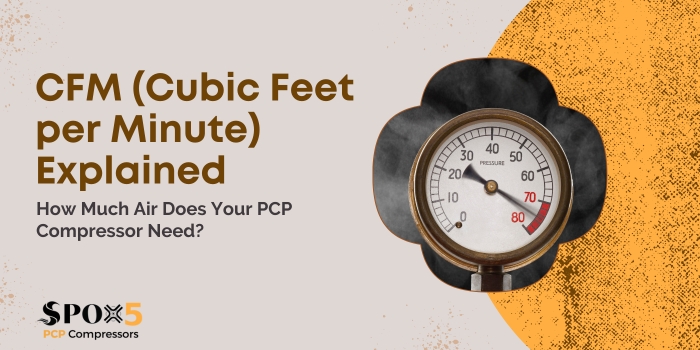Understanding CFM (Cubic Feet per Minute) is crucial when selecting or using a PCP compressor. It determines how much air your compressor can deliver, impacting its efficiency and suitability for specific tasks.
What is CFM?
CFM measures the volume of air a compressor can deliver in one minute. A higher CFM means more air can be supplied, which is essential for tasks requiring large amounts of compressed air, like inflating large tires or operating pneumatic tools.
Why CFM Matters
- Task Suitability: Different tasks require varying CFM levels. Understanding your specific needs helps you choose a compressor that can handle the job efficiently.
- Compressor Efficiency: A compressor with a higher CFM than needed might consume more energy without providing significant benefits. Conversely, a compressor with insufficient CFM will struggle and might overheat.
- Fill Time: For PCP air rifles, a higher CFM means faster fill times, saving you time and effort.
Factors Affecting CFM
Several factors influence a compressor’s CFM output:
- Motor Power: A more powerful motor can typically deliver higher CFM.
- Compressor Design: The type of compressor (piston, rotary screw, etc.) and its internal components affect CFM.
- Pressure: CFM is often measured at a specific pressure. Higher pressure usually results in lower CFM.
- Duty Cycle: The time a compressor can run continuously without overheating affects its sustainable CFM output.
Choosing the Right CFM for Your Needs
To determine the ideal CFM for your PCP compressor, consider the following:
- Intended Use: What will you primarily use the compressor for? Filling air rifles, inflating tires, or powering pneumatic tools?
- Maximum Air Consumption: Identify the highest air consumption of the tools or equipment you’ll use.
- Duty Cycle: How frequently and for how long will you use the compressor?
- Compressor Size: Larger compressors typically offer higher CFM but might be overkill for occasional use.
Additional Considerations
- CFM and PSI: While CFM measures the volume of air, PSI (pounds per square inch) measures the air’s pressure. Both are essential for different applications.
- SCFM (Standard Cubic Feet per Minute): This measures air flow at standard temperature and pressure, allowing for accurate comparisons between different compressors.
- Compressor Efficiency: Look for compressors with high volumetric efficiency, meaning they deliver more air per unit of energy consumed.
By understanding CFM and its impact on your PCP compressor’s performance, you can make informed decisions to select the right equipment for your specific needs.

